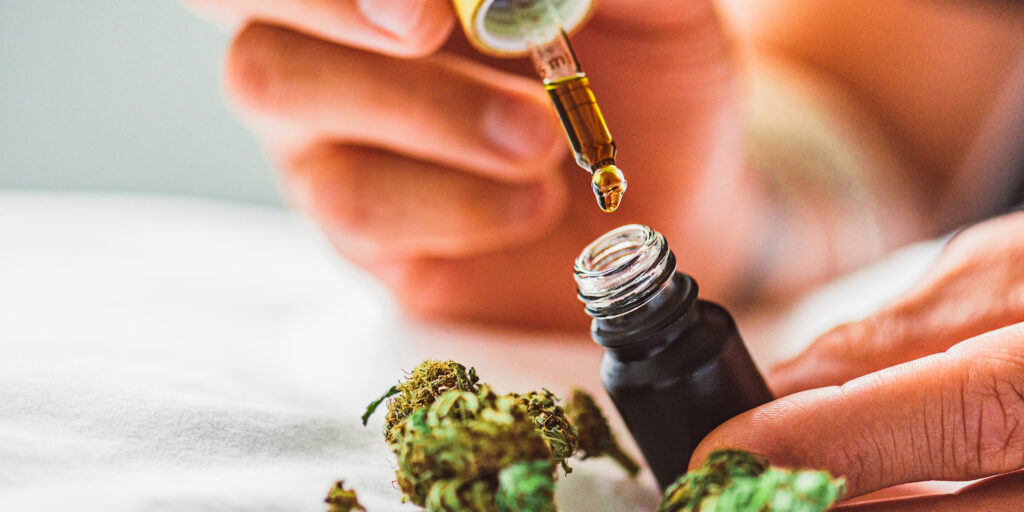Earlier this month, the U.S. Food and Drug Administration (FDA) for the first time issued warning letters regarding products that contain delta-8 THC. Letters were issued to five companies that were marketing products labeled as containing delta-8 THC in ways that, according to the FDA, violate the Federal Food, Drug, and Cosmetic Act (FDCA). Additionally, the FDA stated that delta-8 THC is an unsafe food additive under the FDCA. The letters draw attention to an increasingly prominent substance that some in the cannabis community have asserted is legal to sell.
What is delta-8 THC?
There are a number of chemical compounds present in cannabis, referred to collectively as cannabinoids, with the most well-known cannabinoids being tetrahydrocannabinol (THC) and cannabidiol (CBD). At the federal level, one specific isomer of THC, delta-9 THC, is listed as a Schedule I controlled substance under the Controlled Substances Act (CSA). The passage of the Agriculture Improvement Act of 2018 (i.e., the 2018 Farm Bill) removed hemp — defined as cannabis, including any derivatives, extracts, cannabinoids, or isomers, containing less than 0.3% delta-9 THC on a dry weight basis — from the definition of “marihuana.”
Delta-8 THC is a tetrahydrocannabinol isomer, meaning it has the same chemical formula as delta-9 THC, but the atoms are arranged differently. Like delta-9 THC, delta-8 THC is known to be psychoactive, though it is generally considered less potent. Delta-8 THC is generally derived from hemp, and advocates claim that this form of delta-8 THC became legal with the passage of the 2018 Farm Bill.
The FDA’s Approach to Delta-8
The FDA’s recent warning letters — to ATLRx, Inc., BioMD Plus LLC, Delta 8 Hemp, Kingdom Harvest LLC, and M Six Labs, Inc. — all cite impermissible health claims that the companies have made on social media, blog posts, or product pages. According to the FDA, any delta-8 THC product claiming to diagnose, cure, mitigate, treat, or prevent diseases is considered an unapproved new drug. Examples of some of the claims cited include:
- “Delta-8 THC can be used to suppress the immune response in your body. If a patient is suffering from autoimmune diseases, Delta-8 THC will offer some relief and support. Some of these diseases include lupus, HIV/AIDS, and multiple sclerosis.”
- “Delta-8-THC benefits . . . Antitumor . . . Antiemetic . . . Appetite-stimulant . . . Analgesic . . . Neuroprotective properties . . .”
- “[D]elta-8-THC was administered to eight children being treated for hematologic cancers. The children were 3 to 13 years old . . . [t]hey all experienced vomiting because of the chemo . . . they received delta-8-THC with their chemotherapy treatments, every single child stopped vomiting during and after their chemo sessions!”
- “Delta-8 THC can be used to suppress the immune response in your body. If a patient is suffering from autoimmune diseases, Delta-8 THC will offer some relief and support. Some of these diseases include lupus, HIV/AIDS, and multiple sclerosis.”
No FDA-approved drugs contain delta-8 THC, and the FDA has stated that it has not evaluated whether these unapproved drug products are effective for the uses manufacturers claim, what an appropriate dose might be, how they could interact with FDA-approved drugs or other products, or whether they have dangerous side effects or other safety concerns. Furthermore, the FDA has stated that some people who have consumed these products have reported adverse events.
The FDA also stated in the warning letters that delta-8 THC is an unsafe food additive, unapproved for use in any conventional food. The warning letters called out a wide variety of food products containing delta-8 THC including syrup, peanut brittle, chewing gum, caramels, sugar, and gummies. According to the FDA, all conventional food items containing delta-8 THC are adulterated under the FDCA. LegitScript has noticed a growing trend of edible products, especially gummies, that contain delta-8 THC being sold online.
The Future of Delta-8 THC
Both state and federal laws appear to be catching up to clarify regulations on delta-8 THC. At the state level, at least 14 states currently ban delta-8 THC derived from hemp entirely. At the federal level, it appears that the FDA intends to persist in enforcement of delta-8 THC products that violate the FDCA. According to FDA Principal Deputy Commissioner Janet Woodcock, M.D.:
“The FDA is very concerned about the growing popularity of delta-8 THC products being sold online and in stores nationwide. These products often include claims that they treat or alleviate the side effects related to a wide variety of diseases or medical disorders, such as cancer, multiple sclerosis, chronic pain, nausea and anxiety. It is extremely troubling that some of the food products are packaged and labeled in ways that may appeal to children. We will continue to safeguard Americans’ health and safety by monitoring the marketplace and taking action when companies illegally sell products that pose a risk to public health.”
That said, some federal lawmakers appear to be increasingly frustrated about the lack of regulation and guidance on CBD, delta-8 THC, and other cannabinoids. For example, the ranking member of the House Oversight and Reform Committee, Rep. James Comer (R-KY), recently wrote a letter saying that he wanted to “examine the failure of [FDA] to develop a regulatory regime that effectively oversees the sale of hemp-derived extracts such as cannabidiol (CBD).”
Want to learn more?
Delta-8 THC isn’t the only cannabinoid emerging as a popular alternative to delta-9 THC. Want to hear about others you should know about? Listen to our recent talk about everything cannabis on Merchant Risk Live.





